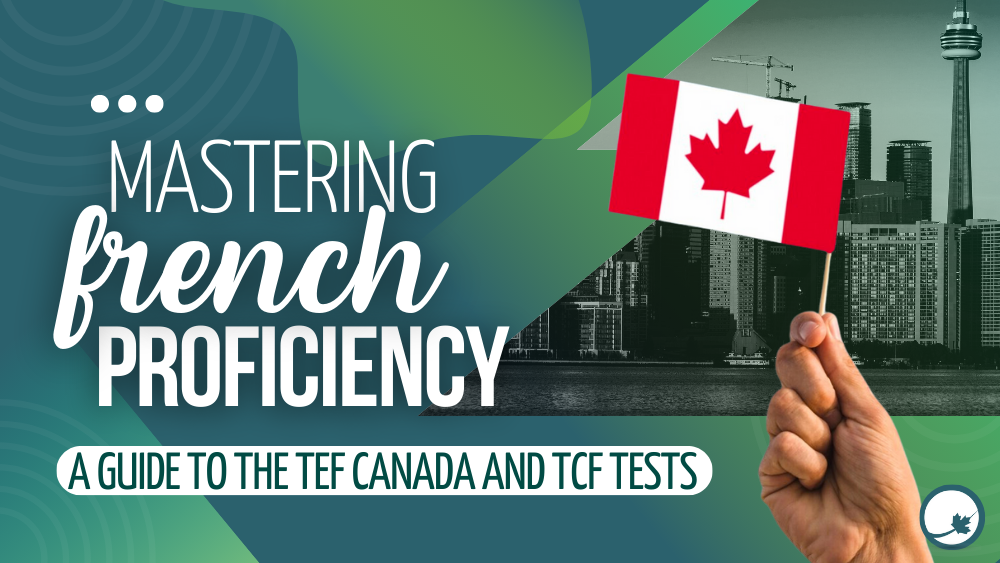MASTERING FRENCH PROFICIENCY: A GUIDE TO THE TEF CANADA AND TCF TESTS
In the realm of French language certification, two prominent assessments stand out for non-native speakers: the Test d'Évaluation de Français (TEF) Canada and the Test de Connaissance du Français (TCF). Both tests serve as a benchmark for measuring French proficiency, catering to a wide array of needs from immigration to academic applications. This article delves into the specifics of each test, offering insights into their structure, purposes, preparation tips, and frequently asked questions to guide test-takers towards achieving their language certification goals.
The TEF Canada is specifically designed for individuals aiming to immigrate to Canada or acquire Canadian citizenship. Recognized by Immigration, Refugees and Citizenship Canada (IRCC), the TEF Canada assesses four key language skills: listening, speaking, reading, and writing. It provides a comprehensive measure of French proficiency, aligning with the Common European Framework of Reference for Languages (CEFR) levels from A1 to C2.
Components: Comprising four sections, the test evaluates oral comprehension, written comprehension, oral expression, and written expression.
Scoring: Each section is scored independently, offering a detailed view of the candidate's proficiency across different language competencies.
Preparation: A wealth of resources, including sample tests, online courses, and official guidebooks, are available to help candidates prepare.
Validity: The TEF Canada results are valid for two years, catering to the timelines of most immigration and citizenship applications.
Registration for the TEF Canada must be done through an authorized test center. It's advisable to contact the nearest center directly for details on registration procedures and dates.
There are several resources available for TEF Canada preparation, including official preparation guides, sample tests available online, language courses focused on TEF preparation, and language learning apps.
Both TEF Canada and TCF Canada are accepted for Canadian immigration and citizenship applications. The main difference lies in the organization that administers them. The choice between the two may depend on personal preference or availability in your region.
The time frame for receiving TEF Canada results can vary, but it generally takes a few weeks. Check with the specific test center for more accurate information.Prospective test-takers often seek clarity on these aspects to better prepare for the TEF Canada, ensuring they meet the language requirements for their immigration or citizenship goals.
The TCF stands as a versatile option for assessing French language proficiency, accepted by academic institutions, professional bodies, and immigration authorities, including Quebec's immigration department. It evaluates a range of skills through compulsory sections on listening, reading, and language structures, with optional modules for speaking and writing. Like the TEF, the TCF aligns with the CEFR levels, ensuring a universally recognized certification of language skills.
Versions: The TCF is available in several versions, including TCF Tout Public, TCF for French Nationality (TCF ANF), and TCF for Quebec. Each version of the TCF is tailored to specific requirements: TCF Tout Public is a general test for all purposes, TCF for Quebec is designed for Quebec immigration applicants, and TCF for French Nationality is specifically for those seeking French citizenship.
Format: With a mix of multiple-choice questions and specific tasks for the optional sections, the TCF offers a comprehensive assessment of French language proficiency.
Preparation: Candidates can utilize official preparation materials, practice tests, and language courses to gear up for the test.
Validity: TCF scores are valid for two years, aligning with the needs of most institutions and immigration processes.
The TCF has several modules, including compulsory sections on listening, reading, and language structures, with optional speaking and writing sections. The structure may vary slightly between different versions of the TCF, such as TCF Tout Public, TCF for French Nationality (TCF ANF), and TCF for Quebec.
Registration is done through authorized centers, often found in French language schools or cultural institutions. It's recommended to contact the nearest test center directly for information on registration procedures and dates.
The TCF provides a score that aligns with the CEFR levels from A1 (beginner) to C2 (advanced). Each candidate receives a certificate indicating their proficiency level in each tested area. There are no pass or fail marks; the score simply reflects your level of French.
TCF results are typically valid for two years from the date of the exam. This validity period is accepted by most institutions and immigration authorities.
The timeframe for receiving TCF results can vary but typically ranges from a few weeks to a month after the test date. Check with your test center for more specific information.
Prospective test-takers often seek clarity on aspects such as the purpose and necessity of these tests, registration processes, preparation resources, scoring, and the implications of their results. Key inquiries include the differences between the TEF Canada and TCF, the structure and scoring of each test, and the validity and recognition of the test results.
Both tests require thorough preparation, with a range of study materials available to support candidates. From official guidebooks and sample tests to comprehensive language courses, test-takers have numerous tools at their disposal to enhance their proficiency and confidence in French.
Whether aiming for Canadian immigration, seeking citizenship, or pursuing academic and professional opportunities in French-speaking environments, mastering the TEF Canada or TCF is a crucial step. Understanding the nuances of each test, from their structure and scoring to preparation strategies, empowers candidates to approach their language certification journey with confidence. With the right preparation and resources, achieving a high level of French proficiency is within reach, opening doors to a myriad of opportunities in the Francophone world.














